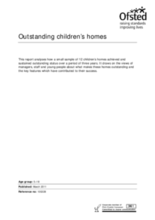This report analyzes how a small sample of 12 children’s homes in England achieved and sustained outstanding status over a period of three years. It draws on the views of managers, staff and young people about what makes these homes outstanding and the key features which have contributed to their success. The report is written for those who manage and work in children’s homes, for those who make decisions about where to place looked after children, and for those who develop social care policy. It describes and interprets what inspectors found to be the reasons for success in these outstanding homes and how the providers themselves explained the factors that contribute to outstanding care. The experience of the children and young people who live in these homes is also a key element of the report as it is, of course, the real hallmark of quality.
The evidence of this survey suggests that, above all, it is the quality of relationships that young people are able to forge with staff, with each other, and where possible with their families, which are the defining factor for success. Throughout the report, there are examples of where staff members at the children’s home have played the role of a committed parent in supporting learning in the home, and advocating for children and young people in their education. The commentary provided by young people themselves made clear just how important relationships with staff were in building their confidence and self-belief, and inspiring them to achieve. In addition to strong, supportive relationships, all the homes visited in this study also had high aspirations for the children and young people in their care. They were committed to ensuring that every child received a good education and in some cases attendance at full-time education was an explicit element of the placement agreement. It is these factors, among others, to which the report attributes the successes of these children’s homes.
However, even in these outstanding children’s homes more could be done to track the achievements of young people in education and employment over time and to draw more on the skills and abilities of the leaders and staff working in consistently outstanding homes for the benefit of the whole system. Even for the very best homes opportunities to share best practice and learn from others can be relatively limited and the report finds that the skills of these outstanding leaders are not being used to their full potential to improve the sector. Ofsted finds it has a role in identifying and publicizing best practice, and it is hoped that this report, and the recommendations included within it, will make a significant contribution to this.

